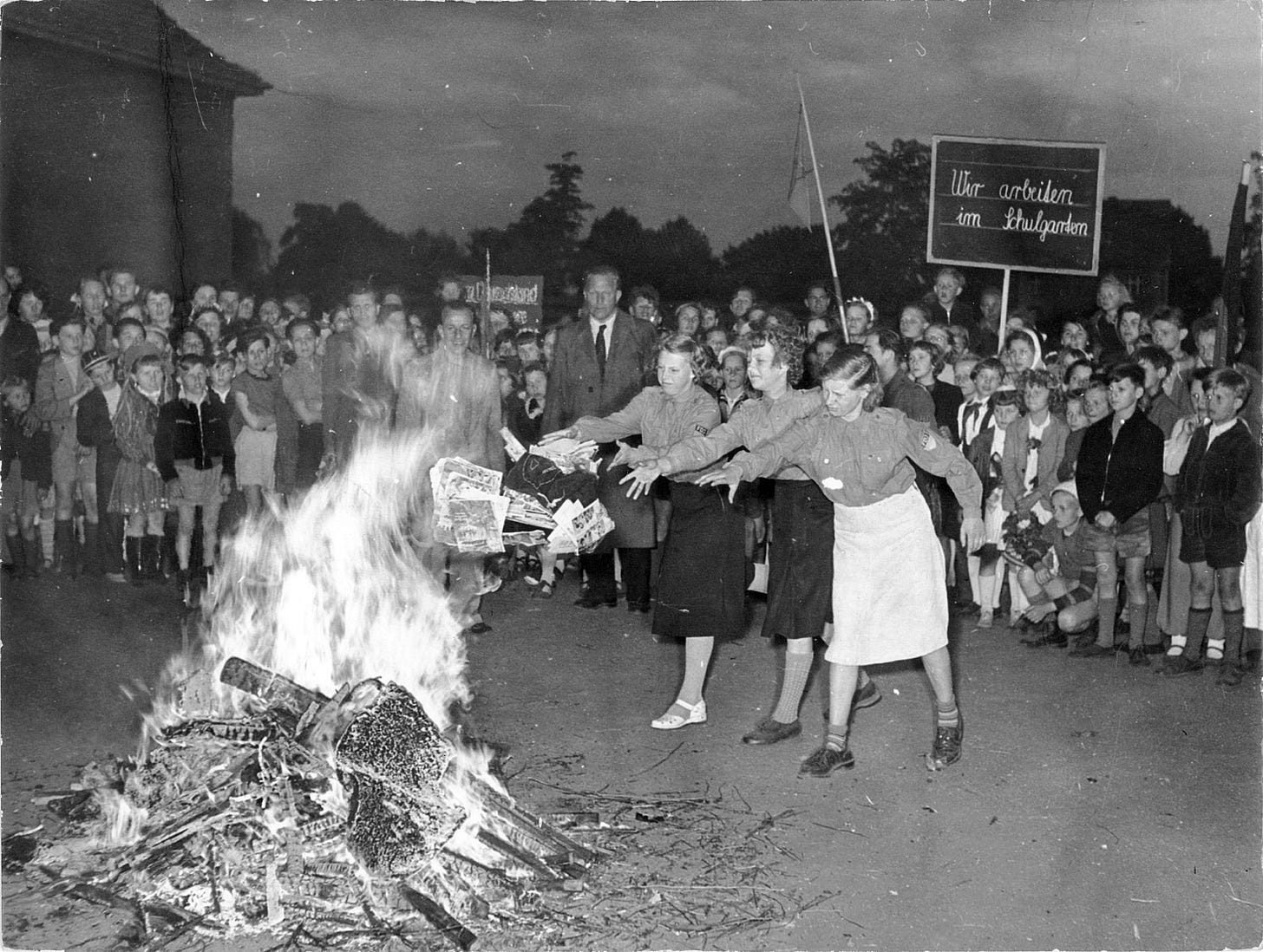The Book Ban Paranoia
Also: Peter Brown’s memoirs, Francis Spufford’s alternative history, the totalitarian avant-garde, and more.

The American Library Association is at it again. Earlier this year, the ALA released its annual report on demands to censor book titles in public and private libraries. They reported that demands increased by 38% in 2022 and concerned mostly explicit material in elementary school libraries.
The mass media, in turn, reported that this was a shocking increase and a matter of concern for people interested in free speech. The New York Times reported that the “explosion” in bans was “worrisome”:
The movement has been supercharged by a network of conservative groups — including organizations like Moms for Liberty and Utah Parents United — that have pushed for book removals and have lobbied for new policies that change the way library collections are formed and book complaints are handled.
As I reported here, the numbers were much less concerning when viewed in the larger context:
The ALA is pitching the number of challenges (1,269) as an alarming increase—up almost 50% from challenges filed in 2021. It has been tracking these for 20 years, and every year between 300 and 500 challenges are typically filed. So, 1,269 is indeed a big increase. Is it alarming? No.
First, 1,269 challenges across 117,000+ libraries just isn’t that significant. I am guessing that several libraries reported multiple challenges, which means that we are likely talking about less that 1% of libraries across America reporting a request from a patron or parent to remove a book. That would mean 99% of libraries reported no challenges at all.
Second, the ALA is describing these requests as attempts to curtail free speech, but most of them concern material that patrons or parents think is sexually explicit and don’t want their children to read. (The ALA says that “the vast majority were written by or about members of the LGBTQIA+ community and people of color.”) This isn’t about asking the government to shut publishers down. It is (mostly) about determining what is appropriate for children and teens to read.
Over half of these requests (58%) were filed in public school libraries, and most of the “most challenged” books in 2022 were Young Adult titles treating transgenderism or homosexuality.
No doubt looking to capitalize on positive coverage from the press, the ALA has now released a “preliminary” report on book bans in 2023. It states:
Between January 1 and August 31, 2023, ALA’s Office for Intellectual Freedom (OIF) reported 695 attempts to censor library materials and services and documented challenges to 1,915 unique titles. The number of unique titles challenged has increased by 20 percent from the same reporting period in 2022, the year in which the highest number of book challenges occurred since ALA began compiling this data more than 20 years ago.
The 20% figure concerns the number of unique titles, but the actual number of requests to censor is only up by 14—from 681 in 2022 to 695 in 2023. That’s right. Across nearly 120,000 libraries, which serve millions of students and patrons, 14 more requests to censor have been filed.
This inconvenient fact hasn’t stopped the mass media from stoking paranoia. Axios calls these added 14 requests a “surge.” USA Today calls them a “dramatic increase” and suggests that requests to censor sexually explicit material in schools threaten our democracy.
PEN America has released its second report on banned books in schools, but the numbers are also misleading.
PEN reported that there were 3,362 instances of censorship of 1,557 titles (some titles are the object of multiple requests to censor) in schools during the 22-23 academic year. The total number of instances was up from 2,532 during the previous academic year, but the number of unique titles was down from 1,643.
Of those supposed 3,362 instances of censorship, however, we find that only 1,886 were actual instances of censorship. The other 1,476 were books banned “pending an investigation.”
The report unfortunately does not list the number of schools it investigated, but according to the National Center for Education Statistics, there were nearly 130,000 public and private K-12 schools in the United States in 2020. (Figures for 2023 are not available.) 1,886 instances of censorship across nearly 130,000 schools comes out to one book banned for every 68 schools. Even taken as a very rough estimate, this hardly seems like a widespread and dangerous phenomenon, especially considering the motivation is an old one (parents protecting children from explicit material).
It is worth noting, too, that 1,313 of the supposed 3,362 instances of censorship originated with the schools’ administration, not the parents. Furthermore, PEN reports that nearly 600 of the challenges were “informal,” which means what? A librarian remembers someone asking a book to be removed or overhears someone complaining about a book?
This isn’t to say that the number of requests are not going up or that parents are not sometimes intemperate, but to see a few extra requests to remove books that parents believe are not age-inappropriate as an attack on democracy is laughable.
In other news, Joseph Epstein reviews Peter Brown’s Journeys of the Mind: A Life in History: “Born in 1935 to a Protestant English family in Ireland, off to university as an Irishman in England, later a European in America as a teacher first at Berkeley, then at Princeton, as a boy and then as a man always in a minority and detached from the main stream of things, Brown has been a true outlier in the best sense of the word. This situation, his condition in a perpetual minority position, may well have conferred upon him the original point of view and interesting outlook that have long characterized his work.”
John Wilson reviews David J. Helfand’s The Universal Timekeepers: Reconstructing History Atom by Atom. Despite moments of hyperbole, Wilson writes, “I finished Helfand’s book in awe not only of his learning, but also the whole enterprise of science that his book represents. And, in a small but not insignificant way, I see the world—the whole shebang, in fact, and not just our little part of it—differently thanks to Helfand.”
Alex Preston praises Francis Spufford’s alternative history thriller: “Spufford’s “what if” is a fascinating one: he imagines that the variant of smallpox that arrived with European settlers was variola minor, both dramatically less fatal than variola major and conferring immunity on those who contracted it. This virological sleight of hand means that, far from being almost entirely wiped out (it’s estimated that between 90-95% of Indigenous peoples in North America were killed by smallpox and other European diseases), there is a huge and thriving Native American population in the US in 1922, when this novel is set.”
The totalitarian avant-garde: “In this important book, Michael J. Pearce, who is Professor of Art at California Lutheran University, dissects the weaponising of art as propaganda. He ranges from its extremely violent origins in revolutionary France, to the extraordinary adoption of supposedly avant-garde art by the United States of America to counter the totalitarian powers of National Socialist Germany and the Stalinist Soviet Union.”
The problem with the true crime phenomenon: “True crime has an unfortunate propensity to exploit the victims who serve as its main characters, as Knox notes in her podcast Blood Money, even as it purports to offer them a voice. ‘You see storytellers approaching victims, assuming what their perspective is,’ she says, drawing an analogy to the way prosecutors will solicit victims to speak at sentencing hearings—but only if they’re willing to say certain things, to play a certain role. ‘Sure, center the victim, as long as it’s furthering the agenda of this other person.’”
Studio Ghibli to be acquired by Nippon TV: Weeks after the celebrated Japanese animator Hayao Miyazaki made his long-awaited comeback, the studio he founded almost four decades ago has secured its long-term future, easing concerns over its struggle to find a successor. Studio Ghibli said this week that the company would be acquired by the private broadcaster, Nippon TV, which promised to continue building on Ghibli’s global success.”
The WGA and the studios have reached a tentative agreement “on a new three-year contract that promises to end the 146-day strike.”
Virgil’s acrostics: “Ten years ago, one of the most disruptive events in my intellectual life occurred at a dinner party at my house. My friend Richard Thomas, who had just given a talk at Baylor University, mentioned that a student of his had discovered an ‘Isaiah acrostic’ in Vergil’s Georgics, a 1st-century BCE poem ostensibly about farming but really about life and the universe. This remark simultaneously opened the door to two phenomena in ancient Greek and Latin poetry that I had not really thought about, despite a lifelong career in Classics: acrostics and Judaism.”




